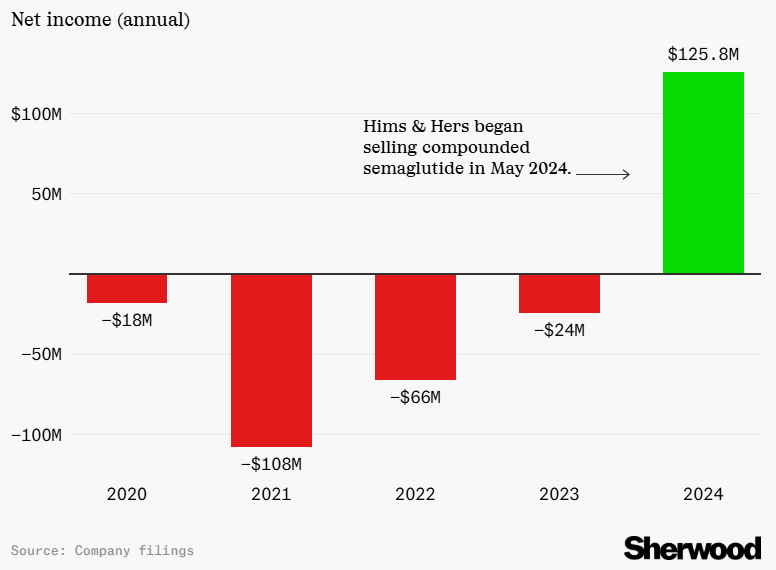The Gut Punch Weekly #9
Major story: FDA declares semaglutide shortage over, halting sale of compounded GLP-1 drugs.
Top Stories
1) FDA Declares Semaglutide Shortage Over, Halting Compounded Alternatives
The FDA has declared an end to the semaglutide drug shortage, effectively terminating the policy that allowed compounders to create less expensive off-brand versions of Ozempic and Wegovy.
Compounders have until April 22 to stop selling copycat versions of semaglutide, which may significantly impact patients by potentially increasing medication costs and limiting access to weight-loss drug alternatives.
Digital health companies like Noom and Hims & Hers are responding differently, with some challenging the FDA's decision and others continuing to seek alternative medication delivery methods.
(Axios)
2) Hims & Hers Stock Plummets on FDA Announcement
The FDA's semaglutide announcement has caused Hims & Hers stock to tumble 26%.
Hims & Hers' weight loss program has been a significant investor success, with company shares climbing over 200% in 2024 and expecting to generate more than $100 million in revenue by the end of 2025.
Hims & Hers had been offering compounded semaglutide at approximately $200 per month, significantly cheaper than brand-name medications like Ozempic and Wegovy that cost around $1,000 monthly without insurance.
(CNBC)
3) Compounding Pharmacies Challenge FDA's Weight Loss Drug Ruling
The Outsourcing Facilities Association (OFA) has filed a lawsuit against the FDA, challenging its decision to remove Novo Nordisk's weight loss drugs Ozempic and Wegovy from the drug shortage list, which would effectively halt compounders' ability to produce copycat versions.
The lawsuit alleges that the FDA is arbitrarily removing the drugs from the shortage list without proper notice-and-comment rulemaking, despite ongoing supply challenges.
This legal action follows a similar lawsuit filed in October challenging the FDA's removal of Eli Lilly's tirzepatide from the shortage list.
4) Unexpected Science Behind Groundbreaking Weight Loss Medication
A groundbreaking scientific discovery began in the 1980s when researchers like Jean-Pierre Raufman tested various animal venoms on guinea pig pancreases, unexpectedly finding that gila monster venom triggered significant pancreatic reactions.
The research revealed a protein in gila monster venom similar to the human GLP-1 hormone, which stimulates insulin secretion and eventually led to the development of diabetes and weight loss medications like Ozempic.
This scientific journey emphasizes the importance of basic research and serendipitous discoveries, demonstrating how seemingly obscure scientific investigations can ultimately produce groundbreaking medical treatments.
(WHYY)
GLP-1 Industry Intel
Eli Lilly Stockpiles Promising Oral GLP-1 Medication: Eli Lilly is proactively building a $548.1 million pre-launch inventory for its oral GLP-1 drug orforglipron, aiming to avoid supply shortages that previously impacted its injectable weight loss medications.
New Zepbound Vial Doses Launched at Lower Prices: Eli Lilly introduced new Zepbound vial doses and a Self Pay Journey Program, reducing prices for self-pay patients to improve affordability of the obesity medication.
A Chemist's Mission Saving Gila Monsters: Dr. Tim Cernak is pioneering 'conservation chemistry' by applying pharmaceutical research techniques to create targeted medical interventions for endangered and sick animals, beginning with a challenging effort to treat a Gila monster's parasitic infection.
New Weight Loss Drugs Aim to Protect Muscle Mass: Drugmakers are racing to create weight-loss treatments that specifically target fat reduction while protecting muscle mass, with several companies exploring myostatin-inhibiting drugs and other innovative approaches.
Ascletis Reveals 6.3% Weight Loss in GLP-1 Trial: Chinese biotech Ascletis Pharma reported promising phase 1 data for its oral GLP-1 drug ASC30, demonstrating 6.3% mean body weight loss after 28 days in early clinical trials.
Frontline Focus
Weight Loss Drugs Fuel Pharmacy Robberies in Brazil: In Brazil, particularly São Paulo, armed robberies targeting pharmacies that carry weight-loss drugs like Ozempic have surged.
Novo Nordisk's Success Reshapes Small Danish Community: Novo Nordisk's groundbreaking weight-loss drugs have not only revolutionized the pharmaceutical industry but have also become an unexpected economic catalyst for Denmark, particularly in the small port town of Kalundborg.
New Obesity Drugs Cause Extreme Weight Loss Concerns: Clinical trials of Eli Lilly's new obesity drug retatrutide show participants experiencing unexpectedly rapid and extreme weight loss, with some participants losing over 30% of body weight and experiencing unexpected health complications.
GLP-1 Clinical Insights
Ozempic Might Help Reduce Cocaine Cravings: A case study reveals that semaglutide, the active ingredient in Ozempic and Wegovy, might help reduce cocaine cravings while simultaneously addressing obesity.
Emerging Dermatologic Risks of Weight Loss Drugs: A comprehensive review reveals that GLP-1 agonists can cause diverse cutaneous adverse effects including alopecia, potential skin neoplasms, hypersensitivity reactions, panniculitis, bullous pemphigoid, and accelerated facial aging.
GLP-1 Receptor Agonists Show Promise in Stroke Treatment: GLP-1 receptor agonists demonstrate significant immunomodulatory effects that could potentially reduce neuroinflammation and improve neurological outcomes in ischemic stroke patients.
Promising Weight Management for Perimenopause Patients: Emerging evidence suggests GLP-1 receptor agonists are highly effective for weight management in women experiencing hormonal transitions, particularly peri and postmenopausal women.
GLP-1 Receptor Agonists Revolutionize Metabolic Disease Treatment: Researchers are exploring the transformative potential of GLP-1 receptor agonists across multiple medical domains, revealing their promising applications in treating diabetes, obesity, cardiovascular diseases, and potentially neurodegenerative conditions.
The Bleeding Edge
Semaglutide Reduces Offspring Metabolic Disorders: A study reveals that semaglutide treatment before pregnancy in obese mice can effectively reduce metabolic disorders in offspring by regulating reactive oxygen species (ROS) levels in oocytes.
Tirzepatide Shows Promise in Parkinson's Disease: In a preclinical study, tirzepatide effectively protected against Parkinson's disease progression by improving dopamine levels, reducing inflammation, and preventing alpha-synuclein aggregation in rats.





